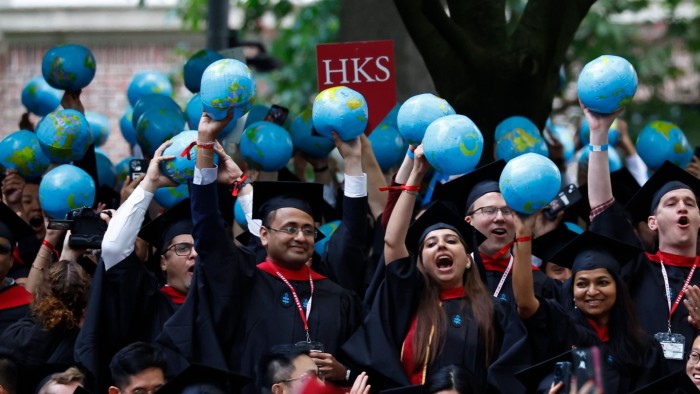Unlock the Editor’s Digest for free
Roula Khalaf, Editor of the FT, selects her favourite stories in this weekly newsletter.
Donald Trump’s assault on science and academic freedoms is a disaster for America. Research funding has been slashed; Harvard and other top universities are being penalised for refusing to kowtow to the White House. Last week, visa applications for international students were halted while the administration works on harsher vetting guidelines. As early as March, three-quarters of postgraduate researchers and PhD students who answered a poll for Nature were considering leaving the US. As the White House attacks continue, more of America’s brightest and best will start to do so.
But this calamity for US-based scientists creates an obligation for other countries to enable their work to continue — and an opportunity to attract top talent. This includes both US researchers and academics who want to leave, and international students who may be put off applying. Several countries have launched efforts to do so, carefully badged as schemes to attract global, rather than specifically American, talent to avoid riling the US president. Yet despite the worldwide renown of its universities, Britain has been dragging its feet. It needs to step up, or it will miss out on a golden opportunity.
Across the Channel, European Commission president Ursula von der Leyen has proposed a €500mn financial package for 2025-27 “to make Europe a magnet for researchers”. France’s President Emmanuel Macron has promised an additional €100mn for initiatives; its business schools have begun fast-tracking or extending applications for foreign students. In April, the Australian Academy of Science unveiled a global talent scheme designed to draw funds to provide competitive relocation packages. Canada is also promoting itself as a close-by destination.
Britain’s efforts have, by contrast, been piecemeal and poorly co-ordinated. The only confirmed new scheme is a £30mn initiative from the Royal Society, with broad scope to attract “global talent”. A £50mn government initiative to fund research grants and relocation is still in the works. The UK needs to go further, faster. Its plethora of world-class universities and research institutes, common language and a familiar culture should be a natural draw. But that in itself is not enough.
The UK will have to offer stronger financial incentives. Researchers’ salaries in both the public and private sector are well below those of US counterparts. This is true for other nations chasing American brains, too, but the particularly exorbitant cost of moving to Britain adds a further impediment. A study for the Royal Society last year found that the upfront visa costs of transferring to the country could be up to 10 times higher than in other leading science nations.
The UK needs a large-scale campaign with a compelling narrative about its attractions for carrying out research — funded adequately in the forthcoming spending review. Bureaucratic and financial hurdles should be lowered, with time-limited, fast-track visas targeted at professors, scientists and entrepreneurs. Stronger marketing from private sector groups across UK industries, such as pharmaceuticals, biotech, aerospace and engineering, would help.
The UK government will, like others, be sensitive about being seen to encourage some forms of immigration when it is committed to reducing overall numbers. But the public may accept carefully designed schemes to lure talent. While many UK universities that would be potential hosts for scientists from overseas are in financial distress, international students are a vital source of financing — and numbers from traditional sources such as Nigeria and India have been falling due to restrictions on bringing family members. As others rush to provide a haven for talent displaced from America, Britain should not lose out.
Read the full article here




